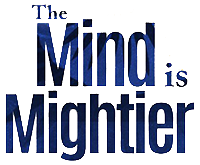The Mind is Mightier | Book Synopsis
Reflections on the Historic Rise of Cognition and Complexity
by Bar-Giora Goldberg
The acceleration of technology and the cognization of a world with rising complexity poses a challenge to most. Many of us feel confused, even scared in front of a fast changing world. The rate of change is not about to slow soon; we must accept that.
“The Mind is Mightier” invites you to join humanity’s quest for understanding, acceptance, and participation in this historical process of rising complexity.
Humanity is on a path of rising cognition. The tedious Darwinian process has given way to a fast and directed cognitive evolution, driving our politics, economy, technology, sciences and arts. Consequently, the world becomes increasingly our idea.
After two horrific world-wars, it seems that the great powers are rejecting the sword in favor of the pen. We are competing of course but we also try to negotiate and create the institutions that allow discourse instead of blows. In the meantime, our sciences, arts, politics and other means of expression steadily become more abstract, more complex.
One hopes for deeper understanding, increased humanity and better use of our natural resources and treatment of mother earth.
Technology is giving us tools and challenging us to change. But the new and more cognitive world is also confusing, sometimes frustrating and changing very fast. Too many of us feel displaced, even lost. Better understanding is the key to regaining our footing and better adjustment in a world of constant flow. As to History, it must be constantly rewritten anew.
Biologists posit that evolution is a random, aimless process. Still, observing the universe and the evolution of life, one cannot escape what seem to be obvious: these processes demonstrate a disposition towards increased complexity! The Universe, perhaps emerging from a Quantum event, life starting from a primitive compound capable of duplication and drawing energy from the environment; few billion years later, we are witnessing an immensely complex, vast universe and species equipped with intricate organs, cooperating in almost a miraculous synergy and eventually creating the human Brain, an organ of immense cognitive and emotional powers of expressions.
The Life phenomena, which seems to many to border on the miraculous, eventually created Language, Cognitive thinking and Artistic & Emotional expressions of untold richness. Is it possible to ignore the evident continuous, relentless drive for the centrality of cognition and higher complexity?
Some seventy thousand years ago, after a long evolutionary process, language dawned on humanity and we took a cognitive path towards a complex social order and civilization. We were already endowed with a big brain, an upright walking gait, a human hand capable of intricate holding and instrument making; we also learned the usage of fire that helped shape the environment, light the night and enhance the digestive process (cooking). The language, however, prepared us for new levels of complex communication skills and life on the abstract-cognitive planes. Many millennia later, we were ready to shift from the nomadic lifestyle towards settling, domesticating animals and grains and forming large and intricate social orders. The transformation from the small hunter-gatherer communities to towns of thousands and then hundreds of thousands demanded a great revolution in our social order.
To take dominion over the earth, we had to cooperate on a scale never seen before. Forming such large social alliances of folks not acquainted with one another required abstraction, thus a large system of make-believes – the children of our imagination – and capacity to grasp abstract concepts, time and the past. Among them: mythology, religion, tribalism-nationalism, future planning, social order, organized religion and morality. We had to think of ourselves as part of a large group with purpose, direction and future.
This required a whole new world-view and concepts of life, living and purpose. The Darwinian physical component of our evolution started to diminish in comparison to the cognitive element that took center stage.
The Mind is Mightier is about this viewpoint of history. It attempts to describe the various historical elements of our cognitive evolution in the great variety of life’s activities: social order, art, science, music, technology, religion, world-order, law and self-evaluation. It attempts to demonstrate the tendency for increased complexity in all the above as we continuously chart new directions and purpose for humanity’s future.
